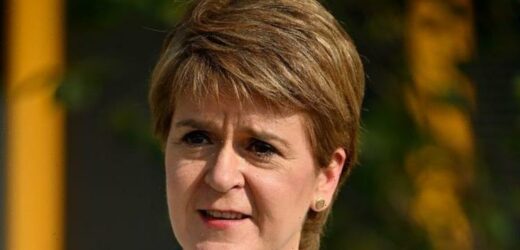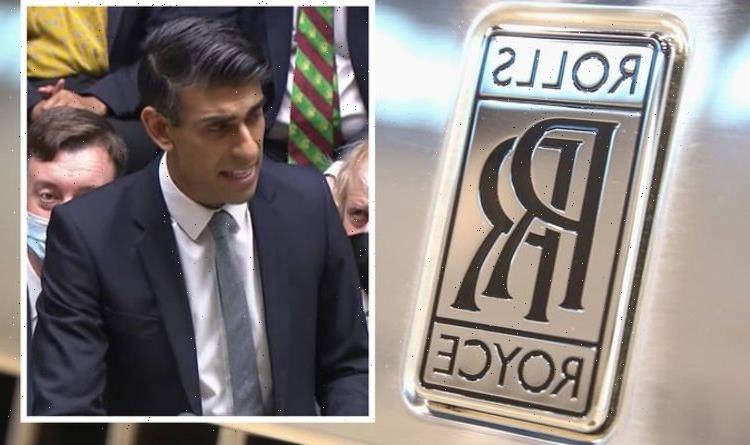Nicola Sturgeon outlines Scotland's actions on climate change
We use your sign-up to provide content in ways you’ve consented to and to improve our understanding of you. This may include adverts from us and 3rd parties based on our understanding. You can unsubscribe at any time. More info
The First Minster missed her renewable heating target after only 6.4 percent of non-electrical heat was met from renewable sources in 2020, despite Edinburgh’s 11 percent target. And making it worse, the Scottish Government’s progress has been on a decline since 2019, when 6.6 percent of non-electrical heat demand was produced from renewable sources. A Government report said that in 2020, “an estimated 2.14 GW of renewable heat capacity was operational in Scotland, producing an estimated 5,074 GWh of useful renewable heat.
And now, Scottish Labour urged the SNP-Greens Government to pull its weight and increase the proportion of heat generated from renewable sources.
Scottish Labour’s net zero, energy and transport spokesperson, Monica Lennon, said: “Despite all their warm words, the SNP’s track record on the environment is one of failure.
“Not only have they missed yet another key target, but things are actually getting worse.
“With COP26 a matter of days away, this exposes the gulf between SNP rhetoric and reality.
“Being a world-leader on the environment requires deeds, not words – the First Minister should take her own advice and deliver credible action.”


This comes as Ms Strugeon prepares to host the COP26 in Glasgow next week, and missing climate targets as the host nation of a climate summit may not fare well for her image.
It helps to explain why she has come under heavy fire for failing to meet these targets at such a pivotal moment.
Zero Carbon Buildings Minister Patrick Harvie for Scottish Greens, blamed on a difficult economic year due to the pandemic, as well as a reduced output from large biomass systems at industrial sites.
Figures from Edinburgh show that biomethane was the second-largest source of Scottish renewable heat in 2020, with 15 percent of renewable heat coming from that energy source.

But Mr Harvie called that missed target “disappointing”.
He said: “Renewable heat generated in Scotland in 2020 was equivalent to 6.4 percent of non-electrical fuels consumed for heat.
“This represents a slight decrease in useful renewable heat generated since 2019.
“Reaching 6.4% renewable heat means we missed the 11 percent target and is clearly disappointing.
“This reduction in renewable heat was largely due to reduced output from large biomass systems at industrial sites and should be seen in the context of a difficult year for the Scottish economy due to the pandemic.
But despite a failure to reach climate goals, Mr Harvie praised Scotland’s progress in building-level renewable heat systems and appeared to support the UK Government’s strategy to decarbonise domestic heating.
DON’T MISS
Archaeology: Nazi U-boat wreck ‘beats Tutankhamun’ [REVEAL]
Spain breaks EU ranks and leads revolt over Russian crisis [REPORT]
NASA telescope spots possible alien world outside Milky Way galaxy [INSIGHT]


He said: “The heat in buildings strategy, published earlier this month, makes clear we must accelerate deployment of zero-emissions heat technologies so that by 2030 over 1 million homes and the equivalent of 50,000 non-domestic buildings are converted to zero emissions heat.
“The heat in buildings strategy sets out an ambitious policy package to achieve this, including our commitment to invest at least £1.8 billion over the course of this parliament to help kick-start growth in the market and support those least able to pay.”
The heat and buildings strategy seeks to address the carbon emissions produced in heating and powering homes, workplaces and public buildings.
The plan aims for Britons to save money on energy bills, and it is claimed that it can support up to 240,000 skilled green jobs by 2035 to help boost economic recovery.
But the Government has come under fire for its heat pump strategy, which is part of the wider heat and buildings strategy.
Boris Johnson has set a target of phasing out gas boilers by 2035 by replacing them with heat pumps that cost around £10,000 each, but has committed to providing £5000 grants to the least well-off.
But the funding pot of £450m over three years, enough to fund 90,000 pumps, has been slammed for falling short of what is required as there are about 25 million gas boilers UK households.
Source: Read Full Article


